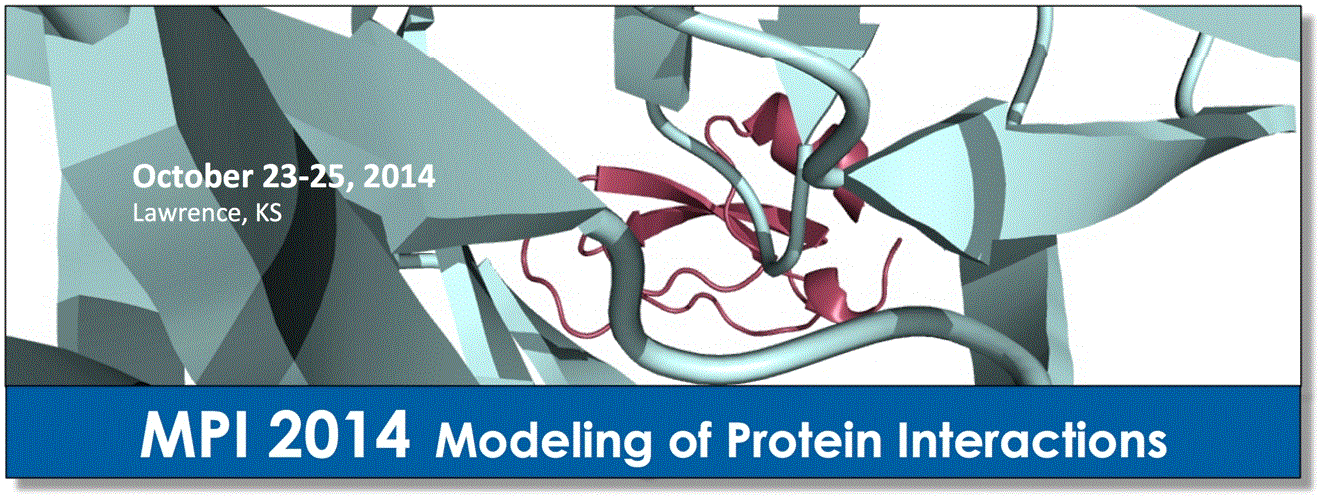PROGRAM
THURSDAY, October 23
7:30 Continental breakfast
8:25 Welcome - Organizers
Session chair: Sternberg
8:35 Wodak, Intertwined association in homo-oligomeric proteins
9:00 Bonvin, Integrative modeling of biomolecular complexes
9:25 Vajda, Teaching new tricks to the old FFT
9:50 Moult, 10 CASP experiments: Successes, bottlenecks, and
challenges in protein structure modeling
10:15 Coffee break
Session chair: Nussinov
10:45 Weng, Protein docking and design
11:10 Dunbrack, TBA
11:35 Vakser, Modeling of model-model complexes
12:00 Lunch
Session chair: Dunbrack
1:30 Elber, Using Molecular Dynamics to rescore predicted
protein complexes
1:55 Brooks, B., Recent advances in free energy methods: NBB,
Constraints, QM/MM, pH, 2D-REM
2:20 Im, Bacterial outer membranes and interactions with
membrane proteins
2:45 Coffee break
Session chair: Zhou
3:15 Lichtarge, Evolution and disease: The calculus of life
3:40 Grishin, Classification of protein domains focusing on
protein complexes
4:05 Slusky, Charge asymmetry in proteins of the outer membrane
4:30 Free time, dinner on your own
Poster session
8:00 - 10:00 Poster presentations, open bar
FRIDAY, October 24
7:30 Continental breakfast
Session chair: Kuhlman
8:35 Nussinov, The structural basis for signaling in cancer
and inflammation
9:00 Sternberg, Disease variants and the Interactome
9:25 Jernigan, Computing free energies for coarse-grained
structures
9:50 Liang, Quantifying biological landscapes at multiscale:
Membrane proteins, chromosome folding, and
stochastic networks
10:15 Coffee break
Session chair: Liang
10:45 Olson, Modeling the biological mesoscale with
autoPACK/cellPACK
11:10 Levy, Promiscuous protein interactions - a burden for the cell
and a tool for the biologist
11:35 Kozakov, Faster and better docking with manifolds and
encounter complexes
12:00 Lunch
Session chair: Camacho
1:30 Zhou, The nonrandom nature of weak interactions between
proteins and bystander macromolecules in cellular
environments
1:55 Feig, Structural and functional implications of non-specific
protein interactions in cellular environments
2:20 Kortemme, Design of protein interactions with modified
and new functions
2:45 Coffee break
Session chair: Olson
3:15 Schueler-Furman, Putting interactions into their proper context
3:40 Deeds, The evolution of crosstalk in signaling networks
4:05 Ray, Structured cellular populations emerging from enzyme-
metabolite interactions
4:30 DISCUSSION, Modeling the Cell
6:30 Reception and 7:00 - 9:00 Dinner at Eldridge
SATURDAY, October 25
7:30 Continental breakfast
Session chair: Ma
8:35 Aloy, Structural systems pharmacology: The role of 3D
structures in next generation drug development
9:00 Brooks, C., Mapping protein-protein interfaces in search of
novel protein-based inhibitor leads
9:25 Camacho, One-click drug discovery solutions among 50 million
compounds for preview and download
9:50 Karanicolas, Small-molecule inhibitors of protein-protein
interactions
10:15 Coffee break
Session chair: Brooks, C.
10:45 Ma, Enhanced sampling and its application in structural
refinement
11:10 Kuhlman, Structure-based design of bispecific antibodies
11:35 Godzik, Cancer in 3D - understanding cancer mutations with
structure and network modeling
12:00 Lunch
Session chair: Feig
1:30 Xu, Joint evolutionary coupling analysis for residue-residue
contact prediction
1:55 Elofsson, Improved contact predictions using the recognition
of protein like contact patterns
2:20 Yeates, TBA
2:45 Coffee break
Session chair: Grishin
3:15 Bates, A flexible approach to the study of binding funnels
3:40 Mitchell, Using orthologs to improve signal-to-noise in scoring
near-native docking predictions
4:05 Kundrotas, Choosing the right one: Post-processing of initial
docking models
4:30 Concluding remarks - Vakser, Vajda
